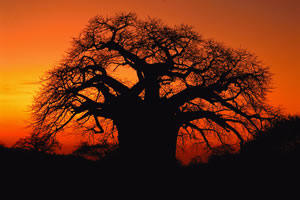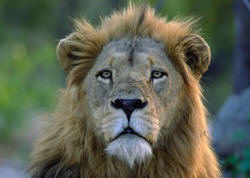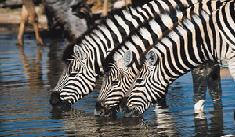


Abu Camp, set in a
pristine pocket of riverine forest, is situated in a
vast private reserve of 180 000 hectares (400 000
acres) in the heart of the
Okavango Delta.
Named after a very special bull
elephant,
Abu Camp
was the original base camp when Africa's first
elephant back safaris were
pioneered in the Delta 17 years ago. Today it is
located in a grove of magnificent hardwood trees on
the edge of a large lagoon at the edge of the
Okavango Delta with a
resident school of hippo.
An imaginative use of canvas and pole has created a
unique style of tent : high ceilings, wide and airy
spaces, blending in flawlessly with the natural
surroundings. Each of the six en-suite accommodation
units has its own distinctive furnishings and
fittings, many of them antique, imparting an air of
opulence amid the bush setting. Each tent has its
own private elevated teak deck sculpted around one
of the lofty sycomore figs or jackalberry trees with
vistas the likes of which only the
Okavango Delta can
boast.
Well-lit pathways link the
Abu
Camp tents with the main lounge and dining
area. High vaulted tenting opens out onto a tiered
teak deck surrounding a giant termite mound, one of
the characteristic sights of the
Okavango Delta. The
lounge is replete with comfortable antique
furnishings and boasts an absorbing library of field
guides and illustrated volumes on the wildlife
surrounding the camp, as well as throughout the
Okavango Delta. A
well-stocked bar provides drinks and cocktails for
post-safari sundowners around a camp fire while most
of the meals are taken al fresco on the deck. Nearby
a secluded plunge pool enables guests to cool off
and relax.
With its shady trees and views overlooking the
tranquil lagoon,
Abu Camp
is a haven of peace and seclusion.
Abu Camp is unique in
the Okavango Delta in
that it allows guests to interact with the resident
elephant herd, meeting each
individual and initiating a journey into the complex
behaviour of the largest land mammal on Earth.
Guests at
Abu Camp
are invited to become part of the
elephant herd during their stay: watching the
evening feeding, sharing the simple joy of a
frolicking youngster, and accompanying them on foot
as they move through the bush. These
elephant encounters provide
unforgettable magical moments. And viewing wildlife
from atop an elephant allows
a closer approach to other animals than can be
achieved when simply walking as an obvious human
figure.
Abu Camp also offers
morning and afternoon game drives, night drives and
nature walks to view the abundance of fauna and
flora in the area. During the seasonal floods of the
Okavango Delta,
guests are invited to take to the waters in the
mokoros, the traditional poled craft used in the
Okavango Delta.





